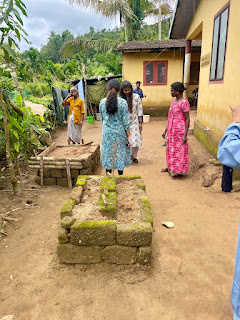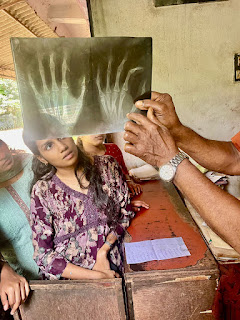"Welcome to the official blog of Mar Baselios College of Education, Sulthan Bathery, Wayanad! This blog is a platform for our college community to share knowledge, ideas, and experiences. We aim to foster a culture of innovation, creativity, and collaboration among our students, faculty, and alumni. Join us in this journey of discovery and growth, and let's work together to shape the future of education!"
Monday, August 28, 2023
Thursday, August 10, 2023
Sharing Locational Knowledge of Wayanad district.
Field Trip to Noolpuzha
The field trip to
Noolpuzha in Wayanad, organized for the students of Mar Baselios College of
Education, was an unforgettable and deeply enriching educational experience
that provided us with profound insights into the traditional practices,
culture, and lifestyle of the tribal communities in the region. Accompanied by
28 enthusiastic students, 2 dedicated teachers, and a ward member, our journey
aimed to explore the art of basket making and to foster a greater understanding
of the challenges and resilience of the tribal population.
Visiting Bamboo Basket
Making Unit
Our
adventure commenced with a visit to the bamboo basket making unit in Noolppuzha,
where skilled artisans showcased their expertise in weaving intricate bamboo
baskets. The process, from selecting the raw materials sourced sustainably from
the surrounding forests to the meticulous weaving techniques, captivated our
attention. They were privileged to witness firsthand the dedication and
craftsmanship required to create each basket, which serves not only functional
purposes but also holds deep cultural significance within the community. Interacting
closely with the artisans, they learned about the various types of baskets
crafted for different purposes such as storage, ceremonial use, and everyday
utility. The artisans graciously shared stories passed down through
generations, revealing the symbolic meanings behind certain designs and
patterns. This exchange highlighted the importance of traditional knowledge in
sustaining cultural identity and preserving heritage amidst modern challenges.
Visit to Mookuthikkunnu
tribal colony
After immersing ourselves
in the artistry of basket making, our journey led us to a nearby tribal colony
in Mookuthikunnu. Welcomed warmly by the community members, they were embraced
into their traditional settlement. The simplicity yet resilience of their
housing structures stood testament to their deep connection with nature and
sustainable living practices. We were touched by their hospitality as they
generously shared fresh jackfruits with us, a gesture symbolizing their
openness and willingness to engage in cultural exchange. During our visit, we
engaged in meaningful conversations with the tribal elders and community
leaders, who shared insights into their customs, traditions, and the daily
challenges they face. Discussions ranged from the preservation of traditional
knowledge to the impacts of modernization on their way of life. Learning about
their close-knit social structure and collective decision-making processes
provided us with a broader perspective on community dynamics and the importance
of solidarity in overcoming adversity.
Exploring Naturopathic
Medicines
From Mookuthikunnu, the
journey continued to Cheeral, where they explored the practice of naturopathic
medicine among the tribal population. Here, they witnessed firsthand their
reliance on natural resources and traditional healing methods to treat various
ailments. It was inspiring to see how they harness the medicinal properties of
plants and herbs, highlighting their profound understanding of the natural
world and the interconnectedness of health and environment.
Visit to Brick making
unit
Visiting a local brick
making unit near Cheeral further enriched student’s experience. Here, amidst
the rhythmic sounds of craftsmen moulding clay into bricks, they marvelled at
the intricate designs and patterns adorning handmade bamboo baskets. The artistry
and attention to detail reflected not only the skills passed down through
generations but also a deep respect for the materials sourced from their
surroundings.
Visit to Anganwadi
Following we visited the
Anganwadi centre in Noolppuzha. The visit aimed to understand early childhood
education and community-based care. The students observed various activities
designed for child development, including interactive learning sessions and
health checks. They interacted with the Anganwadi staff, gaining insights into
the challenges and successes of the program. The experience highlighted the
importance of grassroots education efforts and provided practical knowledge on
integrating community resources into educational practices. The visit
reinforced the students’ understanding of holistic child development and early
intervention strategies.
Visiting Bamboo Craft
unit
Following we visited
bamboo craft making unit where we had the opportunity to try our hand at making
a simple bamboo item. Under the guidance of the artisans, we learned to weave a
small bamboo basket. This hands-on experience allowed us to appreciate the
skill and patience required to create even the simplest of bamboo crafts. Our
guide explained the cultural significance of bamboo crafts in the local
community. Bamboo is not only a sustainable resource but also a symbol of
resilience and flexibility. Bamboo crafts are often used in traditional
ceremonies and as everyday household items, reflecting the deep connection
between the people and their natural environment.
Visit to Gardens and
Nursery
Students visited Aamees
gardens and plants at Ambalavayal. The purpose of the field trip
was to learn about plant nursery operations, with a specific focus on the
repotting process. The visit aimed to enhance our understanding of plant care,
soil management, and the importance of repotting for plant health and growth.
There they observed many exotic medicinal plant varieties.
Wednesday, August 9, 2023
Wednesday, August 2, 2023
WATER MANAGEMENT POLICY
WATER MANAGEMENT POLICY
Introduction
Mar Baselios College of Teacher
Education, Sultan Bathery, has implemented a comprehensive water management and
conservation program aimed at sustainable resource utilization. This document
outlines the key initiatives undertaken by the college to optimize water usage
and minimize environmental impact.
Rainwater Harvesting
The college has installed a robust
rainwater harvesting system comprising strategically located rainwater
harvesting pits and tanks connected to the campus rooftops. Regular maintenance
ensures optimal system performance and efficiency. Captured rainwater is
utilized for various purposes, including landscape irrigation, toilet flushing,
and groundwater recharge. This initiative has significantly reduced the
college's reliance on municipal water supply, particularly during the dry
season. The environmental benefits include groundwater replenishment and
overall ecological sustainability.
Wastewater Recycling
To further conserve water resources,
the college has implemented a wastewater recycling system. The treated water is
subsequently reused for non-potable applications such as toilet flushing,
landscape maintenance, and general campus cleaning. This initiative has led to
substantial reductions in fresh water consumption and minimized the college's
environmental footprint.
Water Storage and Management
The college maintains a reliable
water supply through a combination of underground and overhead water storage
tanks, supplemented by borewells. To ensure water quality, regular monitoring
is conducted. The college has also adopted water-saving measures, including the
installation of efficient fixtures, regular plumbing maintenance, and promoting
water conservation among the campus community. Additionally, the college has
implemented optimized watering schedules for the campus landscape.
Summer Water Management
The college recognizes the importance
of effective water management during the summer months. Strategies include
optimizing the distribution of stored rainwater, prioritizing water usage for
essential purposes, and closely monitoring water levels in storage tanks.
Harvested rainwater plays a crucial role in supporting various college
activities during the summer, including the 4-day community living camp, the
7-day B.Ed. NSS camp, and the 15-day TTI camps. By utilizing rainwater for
drinking water, sanitation, and other camp requirements, the college
significantly reduces its demand on the municipal water supply and promotes
sustainable practices among students and participants.
Awareness and Education
To foster a water-conscious campus
community, the college has undertaken various awareness initiatives. These
include the dissemination of information through posters and signboards,
conducting workshops and seminars, organizing competitions and quizzes, and
collaborating with the local community on water-related issues. These efforts
aim to educate the campus community about the importance of water conservation
and promote sustainable water practices.
-
A one day workshop on ICT was conducted at the MAR BASELIOS college of education Sultan bathery







.jpeg)

.jpeg)
.jpeg)


.jpeg)

.jpeg)

.jpeg)





